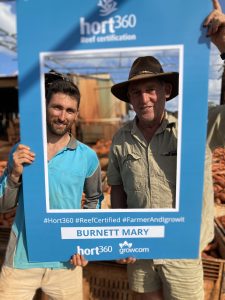Reef Certification program proving a success for sweetpotato growers
Sweetpotato growers are working with Growcom to accelerate adoption of the Hort 360 Reef Certification initiative with a focus on improving reef water quality. Hort 360 is a best management practice program for the horticulture industry that provides growers the opportunity to become certified – showcasing stewardship for the Great Barrier Reef.
In the southern region of the Grant Barrier Reef (GBR), two third generation farming families are among the first in the horticulture industry to be Reef Certified.
Rodney and Brodie Wolfenden from Wolfies Farm at Rossmoya – located in the Fitzroy Basin region –were proud to have their commitment to soil health and irrigation efficiencies recognised through the Reef Certification process. Although they were already Freshcare Environmental accredited, the couple reflected on their motivation to take the additional step of being Reef Certified.

“We’ve been farming sustainably because we believe that it’s better for the soil and the environment,” Rodney said.
“It’s better for us because it gives us the best results. This program closely aligns with how we’ve been managing our business, and it was an easy fit for us.”
The benefits of their approach to soil health – through cover cropping and encouraging soil biology –included reduced pest pressure and a reduction in reliance on chemicals.
“We have observed less pest pressure as a direct result of our approach,” Rodney said.
Leading the way
Ethan and Emily Zunker from Windhum Farms at Qunaba (between Bundaberg and Bargara) were also among the first growers to come on board. They were the first growers in the horticulture industry in the Burnett Mary region to be Reef Certified.
The Zunkers took on the responsibility of getting their macadamia and sweetpotato farms Reef Certified. Emily found that the certification process undertaken with Growcom’s Hort360 Facilitator was straightforward and a great opportunity to tighten up the business’ record keeping processes.
When asked about the changes adopted as a result of the Reef Certification process, Emily explained that the operation had to make some minor tweaks to its existing management practices.
“I’ve migrated the paper-based system into online documents and incorporated the additional records required to be Reef Certified, which is calibration of fertiliser equipment and weather data,” she said.
Reef Certification involves benchmarking farm management practices, working through the certification requirements with a facilitator, and then an independent third-party audit. The audit is only required to be undertaken every three years, and currently the cost of an audit is funded through Growcom’s Hort360 GBR program.
Becoming certified
Reef Certification focuses on water quality outcomes with a strong alignment to existing food safety quality assurance and environmental systems, such as Freshcare Environmental. In fact, any growers who are Freshcare Environmental accredited can become Reef Certified without an audit.
Within the certification there are four key management practice areas – nutrient, sediment, pesticide and water. Practices of focus include soil and leaf testing techniques, nutrient budgeting, decision making tools for irrigation, calibration records and management of topsoil.
It is a voluntary certification pathway that enables growers to demonstrate a strong commitment to land stewardship through managing their farms to industry best practice standards.
Hort360 Facilitator in the southern GBR, Michelle Haase, is extremely happy with the level of interest demonstrated by growers in Reef Certification.
“It’s been a tough 18 months for our industry, and I appreciate that taking on additional certifiable activities can be a real stretch,” Michelle said.
“I’m here to help, and once we go through the questions of the Reef module in Hort360, the majority of growers see that they are already operating at or above best practice.”
Michelle outlined the practices already commonly adopted by growers:
- Crop growth stage leaf, soil and sap testing.
- Fertigation systems.
- Accurate spray records and automated record keeping.
- Use of ag tech such as soil moisture probes, drones, weather stations.
- Grassy inter-rows, headlands, contour banks, riparian vegetation or grassed verges near waterways.
- Use of side throw slashers to mulch tree line.
- Mixed species cover cropping.
- Sediment traps and tail-water dams to capture any runoff
The Hort360 GBR is funded through the Queensland Government’s Reef Water Quality Program and delivered by Growcom. The program is free, and participation is not limited to Growcom members.
Horticultural growers interested in receiving more information on Reef Certification are encouraged to contact Growcom. The module can be undertaken online or over the phone, or in consultation with a Hort360 Facilitator.
Find out more
Visit the Growcom website to learn more about Hort 360.
Please contact Growcom’s Michelle Haase – Southern GBR by emailing mhaase@growcom.com.au or phone 0428 586 890, or Scott Wallace – Hort360 GBR Queensland at swallace@growcom.com.au or on 0408 135 002.

